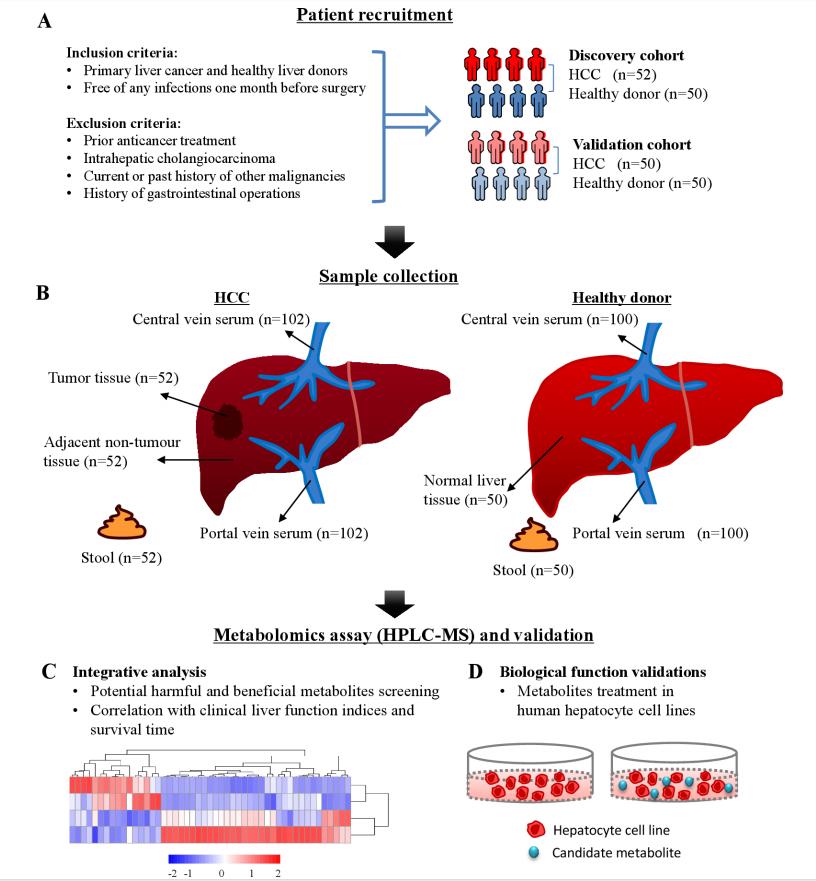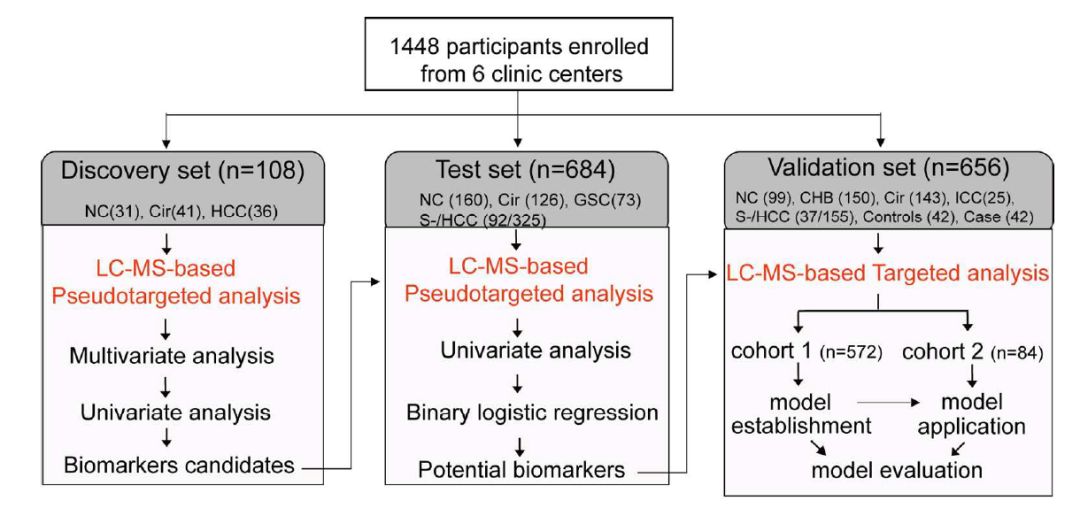Liver cancer is the third most common cause of death from cancer and is becoming increasingly prevalent worldwide. Due to the asymptomatic nature of early liver cancer, biopsies and imaging methods usually detect hepatocellular carcinoma in the mid to late stages. Since many other benign liver diseases can also result in high levels of serum α-fetoprotein, α-fetoprotein has limited sensitivity and specificity. Therefore, liver cancer markers with higher sensitivity and specificity at earlier stages are extremely in demand.
Since metabolic reorganization is an important hallmark of cancer and the liver is the metabolic hub of the living system, it is very useful to study hepatocellular carcinoma from a metabolic perspective. As a non-invasive and non-destructive approach, metabolomics provides holistic information about the dynamic metabolic response of biological systems to endogenous and exogenous disturbances. Thus, metabolomics analysis can help facilitate liver cancer research.
Case 1 Analysis of metabolite changes in portal venous blood (1)
Metabolites play an important role in the formation of hepatocellular carcinoma (HCC). However, most studies are limited by the use of peripheral blood, which may not reflect changes in portal blood and the liver, due to poor accessibility of portal blood. Therefore, this study performed a detailed metabolomic analysis of HCC patients and healthy controls to assess the potential etiology and new therapeutic targets in HCC patients.

Flow chart showing the methods used for metabolomics analysis and biological validation (Liu et al., 2021)
Researchers performed an in-depth comprehensive metabolomic analysis of portal and central venous serum, liver tissue and fecal samples to identify HCC-related metabolites compared to healthy subjects. 2,799 metabolites were annotated in all samples collected, and significant alterations in the metabolome were observed in patients with HCC. The authors compared portal and central venous serum metabolic profiles in HCC patients and healthy controls and found 56 metabolites significantly elevated in the portal vein of HCC patients. The researchers further compared metabolite alterations in tumor tissue and adjacent non-tumor tissue in patients with hepatocellular carcinoma and healthy controls. A total of 116 metabolites were significantly altered in tumor tissue compared to adjacent non-tumor tissue and normal liver tissue. Increased DL-3-phenyl lactate, L-tryptophan, glycocholic acid and 1-methylnicotinamide pathogenic metabolites in portal vein serum and liver tissues of HCC patients were associated with impaired liver function and poor prognosis. Portal vein and fecal levels of linoleic acid and phenol were significantly lower in HCC patients, and both significantly inhibited HCC cell proliferation, suggesting that they play an inhibitory role on HCC cell growth.
Researchers have revealed metabolic alterations in patients with HCC through a comprehensive metabolomic analysis of serum, liver tissue and fecal metabolites. The study identified increased and decreased metabolites in the portal vein, suggesting that they play a key role in the development of HCC.
Case 2 LC-MS/MS for serum diagnostic marker study of liver cancer (2)
The current widespread use of AFP (alpha-fetoprotein) is not very sensitive for diagnosis, so it is important to find early diagnostic markers for hepatocellular carcinoma. Although many studies have been conducted to identify novel meaningful biomarkers from body fluids (blood and urine) for the diagnosis of HCC. However, most of those studies were based on small samples. The panel of these biomarkers is limited by the sample size and the lack of external validation of the population. The heterogeneity of biological background between individuals is high. Therefore, large scale studies are particularly important.
A total of 1488 study subjects from clinical studies conducted at six clinical centers, including normal controls, patients with chronic hepatitis B, patients with cirrhosis, patients with HCC, patients with gastric cancer (GSC), and intrahepatic cholangiocarcinoma (ICC), were included in this study, and serum samples from enrolled patients were collected for untargeted LC-MS/MS metabolomic assays.

Design of the study (Luo et al., 2018).
KDGG signaling pathway analysis of all differential metabolites revealed that HCC-induced differential metabolites were mainly involved in bile acid synthesis, glycine, serine and threonine metabolism; tryptophan metabolism; taurine and sub-taurine metabolic metabolic pathways.
Correlation analysis of the different metabolites with the liver function indicators of the patients revealed that several bile acid levels were positively correlated with aspartate aminotransferase, alanine aminotransferase, total bilirubin, direct bilirubin and indirect bilirubin levels, and negatively correlated with total protein and albumin levels. The levels of these different metabolites were independent of body mass index, AFP level, age and gender.
Resources
- Liu, J., Geng, W., et al. (2022). Integrative metabolomic characterisation identifies altered portal vein serum metabolome contributing to human hepatocellular carcinoma. Gut, 71(6), 1203-1213.
- Luo, P., Yin, P., et al. (2018). A Large‐scale, multicenter serum metabolite biomarker identification study for the early detection of hepatocellular carcinoma. Hepatology, 67(2), 662-675.







